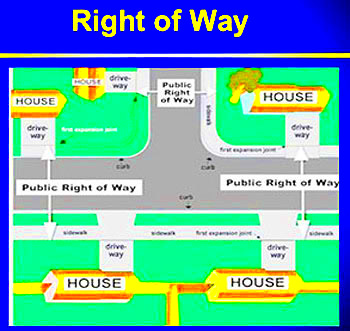Kentucky Property Right of Way Laws Explained
Property right of way laws in Kentucky can be complex, but they are essential for understanding how land use works in the state. Whether you’re a property owner or someone who frequently crosses another’s land, knowing your rights and obligations can help avoid disputes. These laws mainly deal with access to land, the establishment of easements, and resolving conflicts when someone needs to cross your property. In Kentucky, property right of way laws are governed by a mix of common law and state statutes, making it important to be informed before taking any legal action.
What Constitutes a Right of Way in Kentucky?
A right of way in Kentucky refers to the legal right for a person to pass through another person’s property. This right is typically granted through an agreement, deed, or long-term use, which could result in a prescriptive easement. A right of way does not give ownership of the land but rather the right to use it for specific purposes, such as accessing roads or utilities.
There are two main types of rights of way in Kentucky:
- Public Right of Way: This is commonly seen with roads or public utility lines. It allows the public to use a portion of private land without ownership.
- Private Right of Way: Typically involves neighboring property owners, where one person is granted access across another’s land for private use, such as getting to a road or shared driveway.
It’s important to differentiate between these two, as the legal obligations and rights vary depending on the type of right of way involved.
How Easements Affect Property Rights
Easements play a significant role in Kentucky property right of way laws. An easement is a legal right granted to a non-owner to use part of someone else’s property. Easements can be created by a formal agreement, necessity, or long-term use (known as a prescriptive easement).
There are different types of easements in Kentucky:
- Appurtenant Easements: These are tied to the land itself and benefit a neighboring property. For example, a driveway easement allows access to the main road through another’s land.
- Easements in Gross: These are tied to a person or entity rather than a property. A utility company, for example, may have an easement in gross to run power lines across private property.
- Prescriptive Easements: These are established through long-term, continuous use without the owner’s permission. In Kentucky, prescriptive easements generally require a use period of 15 years.
An easement can affect your property rights by limiting how you use a certain part of your land. While you maintain ownership, the person or entity with the easement holds certain rights to use the land. Knowing the specifics of any easements tied to your property is crucial for protecting your rights and avoiding potential legal issues.
Public vs. Private Right of Way in Kentucky
Understanding the difference between public and private right of way in Kentucky is crucial for property owners and users alike. Both types allow access to land, but the implications and regulations surrounding each are quite distinct. This knowledge can help you navigate any related legal matters and ensure you’re fully informed about your rights and responsibilities.
Public Right of Way
A public right of way is designated for public use, such as streets, sidewalks, or pathways. These rights are usually established through government action or local ordinances. Here are some key features:
- Access for Everyone: Public right of ways are accessible to all members of the public without restrictions.
- Maintenance Responsibility: Local or state authorities are typically responsible for maintaining public right of ways.
- Legal Implications: Property owners cannot block access to public right of ways, as doing so may lead to legal penalties.
Private Right of Way
On the other hand, a private right of way is granted to specific individuals or groups, often neighboring property owners. Here’s what to know:
- Specific Use: Private right of ways are limited to designated users, such as a neighbor needing access to their property.
- Less Regulation: The terms are typically agreed upon by the parties involved and may not be subject to extensive government oversight.
- Negotiation: Disputes may arise and often require negotiation or legal resolution between the parties.
Recognizing the differences between these two types of right of way can help you better understand your property rights and obligations in Kentucky.
How to Establish a Right of Way on Your Property
Establishing a right of way on your property involves a few key steps. Whether you’re granting access to a neighbor or creating a pathway for utilities, it’s important to follow legal procedures to ensure everything is documented correctly. Here’s how to go about it:
- Identify the Need: Determine the purpose of the right of way. Is it for a driveway, utility access, or another purpose?
- Talk to Neighbors: If granting access to someone else, discuss your plans with them. Clear communication can prevent misunderstandings.
- Draft an Agreement: Create a written agreement outlining the terms of the right of way. This should include details like the purpose, duration, and any limitations on use.
- Get Legal Advice: Consulting with a real estate attorney can help ensure your agreement complies with Kentucky laws and protects your rights.
- Record the Easement: If applicable, file the agreement with your county clerk’s office. This formalizes the right of way and makes it part of the public record.
Establishing a right of way is a significant legal step. Following these steps can help avoid disputes and protect everyone’s interests involved.
Disputes Over Right of Way and How to Resolve Them
Disputes over right of way can be frustrating and stressful for all parties involved. These conflicts can arise due to misunderstandings, property changes, or disagreements over usage. Knowing how to address and resolve these disputes is essential for maintaining good relationships with neighbors and ensuring legal compliance.
Here are common reasons for disputes:
- Blocked Access: One party may block the right of way, causing inconvenience to the other party.
- Limitations of Use: Disagreements may arise regarding how the right of way can be used, such as what types of vehicles can pass through.
- Maintenance Responsibilities: Confusion about who is responsible for maintaining the right of way can lead to conflict.
To resolve right of way disputes, consider these steps:
- Communicate: Start with a conversation. Open dialogue can often clarify misunderstandings and lead to amicable solutions.
- Review Agreements: Look over any existing easements or agreements to understand the rights and obligations of each party.
- Mediation: If direct communication fails, consider bringing in a neutral third party to help mediate the discussion and facilitate a resolution.
- Legal Action: As a last resort, consult with a lawyer to discuss your options. Legal action can be costly and time-consuming, so it’s often best to explore other avenues first.
Understanding how to handle disputes over right of way can help you protect your property rights while maintaining good relationships with neighbors.
Legal Responsibilities of Property Owners with Right of Way
Property owners in Kentucky have specific legal responsibilities when it comes to right of way. Understanding these obligations is essential to avoid potential disputes and ensure compliance with the law. Whether you own land that others need to cross or you are using someone else’s property, knowing your rights and duties can help maintain peace and clarity.
Here are some key responsibilities for property owners:
- Maintain the Right of Way: Property owners must keep the right of way clear and accessible. This may involve removing obstacles such as debris, plants, or other items that could block access.
- Respect the Terms of the Easement: If you hold an easement, you must adhere to its terms. This could include limitations on the type of vehicles used or the times of access.
- Notify Others of Changes: If you plan to make changes to your property that could affect the right of way, such as construction or landscaping, inform the other party involved.
- Bear Liability: Property owners may be held liable for injuries or damages that occur on the right of way, especially if they failed to maintain it properly.
- Cooperate with Neighbors: Open communication with neighbors about access and usage can prevent misunderstandings and foster goodwill.
By understanding and fulfilling these legal responsibilities, property owners can protect their rights and help ensure smooth use of right of way in Kentucky.
Conclusion on Kentucky Property Right of Way Laws
Navigating property right of way laws in Kentucky can seem complex, but understanding the basic principles can significantly ease the process. Whether dealing with public or private right of way, it’s crucial to know your rights and responsibilities as a property owner or user. Clear communication, proper documentation, and adherence to legal obligations can help prevent disputes and maintain good neighborly relations.
Remember, property right of way is not just about access; it’s about ensuring that everyone involved understands their roles and responsibilities. Being proactive in addressing any concerns can lead to smoother interactions and a more enjoyable living environment for everyone. If you ever find yourself in a dispute or uncertain situation, seeking legal advice can provide clarity and direction.
Frequently Asked Questions About Kentucky Right of Way Laws
Here are some common questions people often have regarding right of way laws in Kentucky, along with straightforward answers:
- What is a right of way?
A right of way is the legal right to pass through or use another person’s property for specific purposes, like accessing a road or utility. - How can I determine if I have a right of way?
You can check property deeds, easement agreements, or consult local land records to find information about any existing rights of way. - Can I block a public right of way?
No, blocking a public right of way is illegal and can result in fines or legal action against you. - What should I do if my right of way is being blocked?
Start by talking to the person blocking it. If that doesn’t resolve the issue, you may need to seek legal advice or mediation. - Can easements be terminated?
Yes, easements can be terminated if both parties agree or if the purpose of the easement is no longer applicable.
These FAQs should help clarify some common concerns regarding right of way laws in Kentucky. If you have further questions, consulting with a legal expert can provide more personalized guidance.


